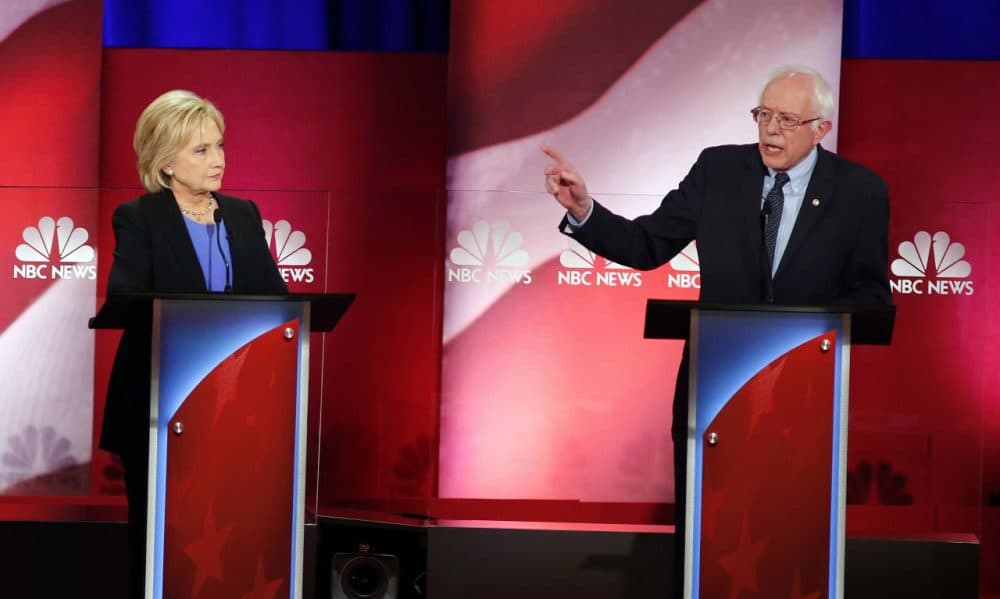Advertisement
Commentary: How Sanders Has Charged Into A Draw With Clinton

The national press decided that Vermont Sen. Bernie Sanders won Sunday night's debate and many pundits believe he is poised to win the Feb. 1 Iowa caucuses and the New Hampshire primary eight days later.
How did this happen?
Much of Sanders’ strength can be found in his speaking style. He speaks in categorical imperatives -- what’s wrong, who the bad guys are and what must be done, regardless of how impractical it is.
Consider the poisoned drinking water in Flint, Michigan. Hillary Clinton believes the federal government should step in and force the state -- actually the Republican governor -- to safeguard water supplies. Sanders has a shortcut: The governor should resign. How this would make the water safe is unclear, but it sounds forceful and colorful.
Clinton’s nuanced and analytical answers often pale by contrast. Asked during Sunday's debate about young African-American men being killed by white police officers, she said, “There needs to be a concerted effort to address the systematic racism in our criminal justice system…retraining police officers, looking at ways to end racial profiling…bringing the disparities that stalk our country into high relief.”
Sanders began by agreeing with Clinton, then shifted to this: “Who is satisfied that millions of people have police records for possessing marijuana when the CEOs of Wall Street companies who destroyed our economy have no police records?” Always back to his anti-corporate pitch, regardless of the topic.
Asked about a 12-year-old black youngster gunned down in Cleveland, Sanders went with, “Whenever anybody in this country is killed while in police custody [not the case in Cleveland], it should automatically trigger a U.S. attorney general’s investigation.”
The contrasts flowed all evening. Indeed this is how the whole Democratic primary has gone. Clinton gives measured, analytical, thoughtful but long responses, while Sanders delivers blunt, brief, categorical answers that capture the spirit of his anti-Establishment campaign. As is the case with his fellow New Yorker, Donald Trump, Sanders makes his campaign more fun for his supporters because it’s so iconoclastic, so easy to understand.
There’s also a difference in how the two Democrats are covered by the national press. National reporters and editors seem to enjoy watching Clinton squirm, as she’s pressed on her emails, Benghazi, Wall Street contributions, the Clinton Foundation, her Iraq vote, even her husband. Is it any wonder she’s lost ground over the past few months?
Meanwhile, what have we learned about Sanders’ background, besides his repeatedly voting against gun control advocates' Brady Bill (something the Clinton campaign has publicized)? As former Massachusetts U.S. Rep. Barney Frank put it, Sanders’ “holier than thou attitude…really undercuts his effectiveness.” Nevertheless, he does have a record of moving progressive amendments through both houses of Congress.
Back when Clinton wasn’t knocking Sanders, national political analysts said she was sitting on a lead, playing it safe, trying to look “inevitable.” When she did go after his record and statements, she was then described as desperate, panicked, in trouble.
The only time Sanders made national TV news this summer and fall was to show his huge rallies, populated by young people, who loved his promise of free college, his bashing of Wall Street and his condemning the criminalization of pot. If you’re 22 years old, what’s not to like?
Clinton was an active and visible first lady, tackling health care in an unsuccessful attempt to expand coverage to the uninsured. Her attempt -- or perhaps her failure -- turned many Americans, especially Republicans and conservatives, against her, seemingly for life. She redeemed herself in the Senate, winning praise from none other than GOP Sens. Orrin Hatch of Utah and Arizona’s John McCain. Her service as secretary of state was applauded uncharacteristically by her predecessor Condoleezza Rice, former Vice President Dick Cheney and South Carolina Sen. Lindsey Graham -- Republicans all.
By comparison, Sanders has been a national figure less than a year. Not a single member of the U.S. Senate has put in a good word for him. In addition to his Senate tenure, he also represented Vermont in the U.S. House and was mayor of Burlington, Vermont’s largest city. He’s a blank slate, all we know is that he calls himself a Democratic socialist, favors universal Medicare, and hates Wall Street CEOs.
If Sanders manages to become the Democratic nominee for president, we will surely learn a great deal about him from the GOP, conservative commentators, Fox News, right-wing talk and evangelical radio. The influential Wall Street Journal has already priced Sanders’ proposals at $18 trillion -- some sticker shock!
Republicans delight in boosting his chances, citing polls that show him leading and Clinton struggling. You’d think -- as Democrats feel about Trump -- the Republicans would rather run against the revolutionary opponent. Like Trump, Sanders is the candidate of memorable answers and a tough demeanor. So far, for both men, it’s working.
Dan Payne is a Democratic political analyst and regular contributor to WBUR Politicker. He tweets @payneco.
